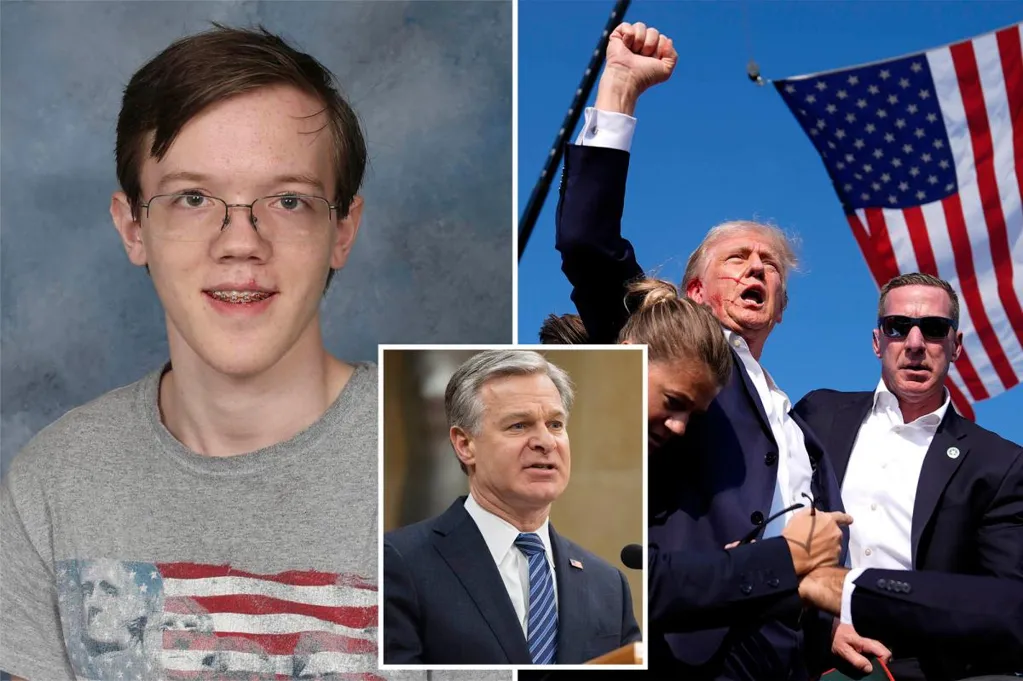The FBI had multiple "missed opportunities" to stop Thomas Crooks before he tried to assassinate President Trump, a former assistant director at the Bureau has told The Post.
Last week, The Post reported on multiple extremist social media posts believed to be tied to Crooks, including numerous threats of political violence and a dramatic shift against Trump, after previously expressing his admiration for the Republican.
If even "half" of Trump's would-be assassin's extremist digital footprint turns out to be true, he should have been on the FBI's radar long before the 20-year-old opened fired on the then-presumptive GOP presidential nominee during a rally in Butler, Pennsylvania, said Chris Swecker, a retired FBI assistant director.
"It's clear that he was popping off on the social media sites and saying things that should have garnered attention," Swecker, who served in the FBI for 24 years, said.
"That constitutes a miss on the part of the FBI," he added, saying that the Bureau's handling of the investigation earned a "a C- grade."
Among the disturbing posts that were recently revealed, were comments on YouTube that included, "I always believed being patriotic was lining up a bunch of socialist Jews and blasting their useless brains out with an AR."
He also wrote "KILL DEMOCRATS" and said that members of the "Squad" should suffer a "quick, painful death."
He also commented: "The only way to fight the gov is with terrorism style attacks, sneak a bomb into an essential building and set it off before anyone sees you, track down any important people/politicians/military leaders etc and try to assassinate them."
Swecker -- who retired from the Bureau in 2006 -- also claimed that the FBI under then-director Christopher Wray was desperate to pin Trump's would-be assassin as a far-right lone gunman.
He said it seemed clear to him that when agents found evidence to the contrary, the Bureau "had its thumb on the scales" of the investigation.
This led to a lack of transparency in the investigation, which allowed conspiracy theories to spread and multiply, he said.
"A little bit of transparency goes a long way in these types of investigations," said Swecker, who served as assistant director of the FBI for the Criminal Investigative Division from 2004 to 2006.
"There was a bias in the FBI towards right-wing extremists. And if there was a right-wing extremist ideology, that got surfaced real quick in any of these shootings. But if there was a left-wing extremist ideology driving it, it was glossed over," Swecker said
He said that view was "shared by a lot of my colleagues" in the FBI.
Asked for comment, the FBI directed The Post to a story about how the Bureau concluded that Crooks acted alone.
On Wednesday, Reps. Mike Kelly (R-Pa.) and Pat Fallon (R-Texas) accused former FBI Director Wray of "stonewalling" the investigation into Thomas Crooks, something Swecker pushed back on slightly.
"To me, what they're calling stonewalling was really a missed opportunity to be somewhat transparent along the lines of enlisting the public and educating them about what they should be," he said.
Swecker, who also served as the FBI's on-scene Commander in Iraq, called on Director Kash Patel to learn from his predecessor's mistakes and release all the files related to Crooks as soon as possible.
"They ought to come out with the full motivation - that's not classified - and then let's get it out there," he said.
"And I think we've got to use the opportunity to teach and educate the public about the threats on social media and the internet," Swecker said.
Swecker also warned that Crooks' radicalization online into a would-be assassin proved that hostile nations could easily use the internet to incite violent crimes in the United States.
"The scariest thing about The Post's article was the thought that a hostile foreign intelligence service or an enemy out there could be looking for guys like Crooks and grooming them and weaponizing them," he said.
"We know ISIS has done that, and they've done it effectively. They've radicalized people on the internet," he added. "Why wouldn't Russia or China or Iran or any of our enemies do just the same thing?"
The threat of foreign radicalization of US citizens "ups the ante in terms of the FBI not letting stuff like this fall through the cracks," Swecker said, as he urged the American public to be more vigilant to such online threats.
While this wasn't about creating "a citizenry full of snitches," Swecker cautioned, "If you know somebody who says 'I'm going to kill the President,' pass that on."
